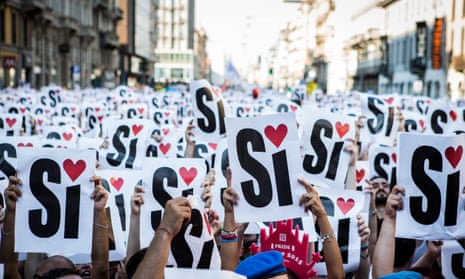Italy violates human rights by not offering adequate legal protection and recognition to same-sex couples, a European court has ruled.
The decision by the European court of human rights increases pressure on the government of Matteo Renzi, the centre-left prime minister who has long promised to pass legislation recognising civil partnerships. Italy is the only major western European country that does not recognise either civil partnerships or gay marriage.
Efforts to move forward on the issue have made little progress since Renzi took office last year, and face significant opposition from Italian conservatives.
The lower house of the Italian parliament approved a motion in June that said the government was committed to pursuing a civil union law. That motion – the first to pass after others were rejected – also opposed the idea that offering rights to same-sex couples could undermine traditional family values.
The European court ruling on Tuesday said gay couples were essentially forced to live double lives in Italy: they could live openly in their relationships, but they did not receive any official recognition of their status as a family.
Specifically the court ruled that Italy was in violation of article eight of the European convention on human rights, which provides for the right to respect for privacy and family life.
The case was brought by three gay couples – all men – who do not have the right to marry or enter into a civil union and described the challenges the lack of recognition posed in their daily lives. The legal move was led by Enrico Oliari, president of a gay rights group called GayLib.
“We are delighted,” Oliari said in a statement. “We arrived at this conclusion at the end of a battle that began 18 years ago with our association and an eight-year fight in the courtroom.”
Ivan Scalfarotto, a member of Renzi’s Democratic party and secretary for constitutional reforms in the parliament, expressed his satisfaction with the decision, which was announcedweeks after the lawmaker ended a hunger strike in protest against Italy’s “serious human rights violation” on gay rights. He ended the strike after the parliament passed its motion and said at the time that he trusted Renzi to act soon.
Scalfarotto said in a tweet on Tuesday that he had engaged in the protest to show that not allowing civil unions was a “grave embarrassment” for Italy and that the country had been condemned.
Ho digiunato per spiegare che non avere una legge sulle unioni gay era un grave imbarazzo per l'Italia. Oggi la CEDU condanna l'Italia. #CVD
— Ivan Scalfarotto (@ivanscalfarotto) July 21, 2015
In the absence of marriage rights in Italy, the European court ruled that the passage of legislation creating civil unions or registered partnerships would be the “most appropriate way for same-sex couples like the applicants to have their relationship legally recognised”. The court noted that 24 out of 47 member states in the Council of Europe had already legally recognised same-sex unions.
The fact that a few cities in Italy – including Rome – have recognised the marriages of some same-sex couples who have married abroad was largely dismissed by the court, which said such local decisions were merely symbolic and did not confer any rights on same-sex couples.
The court also found the fact that same-sex couples in Italy must frequently turn to the already severely overburdened court system to seek protection for even the “most basic issues arising in a relationship” amounted to a “significant hindrance to [their] efforts to obtain respect for their private and family life”.
While same-sex civil unions and marriage are not legally protected in Italy, rules were set up in December 2013 that allowed for “cohabitation agreements”. But the court found that such contracts were limited in scope and failed to provide basic needs to a couple in a stable and committed relationship, such as inheritance rights.
The court also pointed out that such “cohabitation agreements” were designed only to provide certain rights to people who live together, including flatmates, and did not aim to explicitly help couples.
Even though Italy’s highest courts have repeatedly called for the need for laws to recognise same-sex couples, the European court said the Italian legislature had repeatedly failed to take those judgements into account. It also pointed to unspecified opinion polls that the court said supported legal recognition of gay couples.
“The Italian government had not denied the need for legal protection of such couples and had failed to point to any community interests justifying the current situation,” the court said in a press release.

Comments (…)
Sign in or create your Guardian account to join the discussion